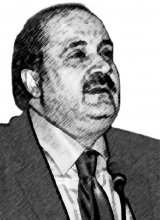You are here
Jerusalem and the always feasible anti-American blowback
Jan 24,2018 - Last updated at Jan 24,2018
In plain words, anti-American blowback is an adverse reaction to American policies, ideals, values and culture beyond native borders. Following aftermaths such as the September 11 attacks, the war on Iraq and Afghanistan, the January 2009 Israeli invasion of the Gaza Strip and down to the most catastrophic decision of moving the embassy to Jerusalem, the US received a considerably significant amount of antipathy in the Arab-Muslim Middle East that edged into what can only be termed as "anti-Americanism".
Today, America is far from being well liked in the region.The level of anger in the Arab and Islamic street has continually been rising, with the situation becoming even shoddier following US President Donald Trump’s decision to recognise Jerusalem as the capital of Israel, a primeval city sacred to Muslims and Christians alike for centuries, and, more recently, to support Israel’s prerogative that the entire occupied city is its united capital. Thus making it impossible for the native Palestinians to have any part of it whatsoever, under any future peace dialogue.
Addressing the House of Representatives, in 1991, in the aftermath of the Gulf War and what was known as the Desert Storm at that time, Martin Indyk, then executive director of the Washington Institute for Near East Policy and foreign relations analyst with expertise in the region, explicated that anti-American feelings have "long been present in the Arab world". Because of those inattentive policies, Indyk's claim affirms that the Arabs and Americans were and will always be condemned to prolonged mutual suspicion and mistrust.
The American foreign policy and its political outlook on the world cause such sensitivities, not the clash of civilisations, as some believe. At times, however, America’s image in the Arab world was somewhat noble. In fact, American missionaries and their students who worked in the region were devout pioneers in higher education. No other concrete instance can be given as evidence of the humanitarian American role than the establishment of the American University of Beirut at the end of the 19th century and later the American University in Cairo. Following World War II in 1945 and the 1967 Arab-Israeli War, the American role in the region became a little more dubious.
However, anti-American blowback does not really spring from prejudiced hatred of America or American culture and democracy, for this matter, but from a profound feeling about the US’ double-standard function as a leading global power. On one hand, at times it is admired for its unequivocal universal supremacy and, on the other, it is antagonised in the light of the disappointing role it has played in not keeping the status, but the quo, in a region that has long suffered from a series of major wars and political conflicts, taking the lead in most. At any rate, anti-Americanism is not an ideology, but a bitter feeling that generally prevails throughout the Arab-Muslim Middle East, to the extent that it has proved to be more expounded following the US’ recognition of occupied Jerusalem as the capital of Israel than it was in the aftermath of 9/11, 2001.
I reiterate His Majesty’s words recently to Vice President Mike Pence emphasising the need to overcome “rising frustrations and rebuild trust” to keep America a leading nation of promise, optimism, justice and fairness, eventually to progress with a two-state resolution leading to an independent, secure, and recognised Palestine with East Jerusalem as its capital.













